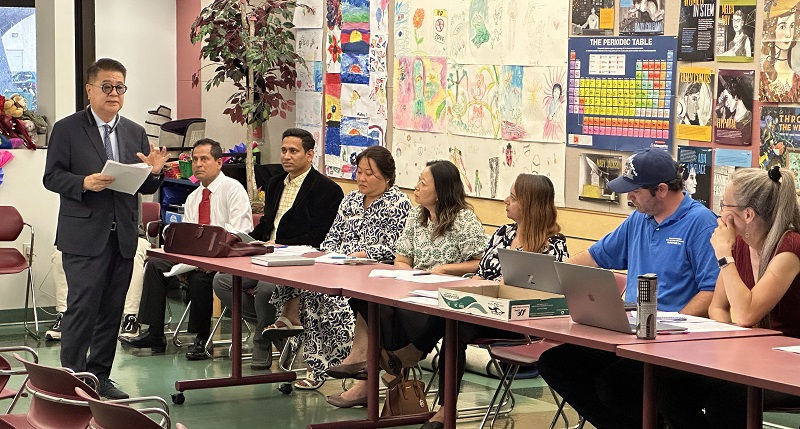Good morning! It’s Monday, July 17, and the scorching heat is upon us. For a long time, Korean immigrants have faced criticism for their limited participation in community service and political activities. However, there is a shift happening as Korean Americans are now actively engaging in grassroots democracy in Los Angeles. In this Issue 16, I will be reporting on the launch of a neighborhood council led by Korean Americans.
Welcome to Katchup Briefing, the Korea Daily’s weekly English newsletter. Here, I will keep you informed with the latest news updates and perspectives from the Korean American community. If you’re interested in exploring more articles and columns from previous weeks, please visit koreadailyus.com.

The newly established council, representing most of Koreatown in LA, is characterized by its significant Korean American representation. Mark Lee, the communications director of the Mission City Community Clinic, was unanimously elected as the new chairperson in the inaugural meeting. Erica Jung was elected as the chief deputy chairperson, Ko Eun Hwang Sara as the treasurer, and Jason Choi as the secretary. All are of Korean descent.
Among the delegates, 19 out of the 26 seats are occupied by Korean Americans, with 23 delegates elected in May while three seats remain vacant. In contrast, in the previous term, only three out of the 26 delegates were Korean Americans.
The elected Korean American delegates include Community Organization Representatives: Nathan Kim, Sandra Choi, Samuel M. Suh, Jennifer Chung, and Mark Lee; Business Representatives: Un Ji Lee, Erica Jung, Hoyle Kang, Kyungho Hwang, Ryan Min, and Jason Choi; At Large Representatives: Hu Ki Ryu, Becky Bae, and Bill Robinson; Youth Delegate: Audrey Han; Sub-District 3 Representative: Ko Eun Hwang Sara; Sub-District 4 Representative: Lillian Han, Timothy Kwak; Sub-District 2 Representative: Claire Cannon.
These delegates, many of whom are first- and second-generation Korean Americans, possess bilingual fluency in English and Korean. It is particularly noteworthy that the elected delegates come from diverse professional backgrounds, including real estate, lobbying, law, oriental medicine, etc.
The newly elected chairperson, Mark Lee, has presented various business plans since taking office. With six years of experience on the Pico-Union Neighborhood Council, including four years as chair, Lee brings valuable leadership skills to the council. He also served as the federal Department of Housing and Urban Development Commissioner for the City of Alhambra from 2016 to 2023, gaining familiarity with city government communication and administration.
Neighborhood councils are organizations that connect the city government with local residents. They discuss the various needs of residents, and the outcomes are conveyed to the city council. They play a vital role in improving the daily lives of residents and the local business environment.
The neighborhood council is an autonomous entity responsible for deliberating and reviewing major issues concerning new and expanded buildings, conditional use permits, traffic safety, and environmental beautification within its jurisdiction.
During the pandemic, the council meetings transitioned online, resulting in a drop in participation among first-generation Koreans due to language barriers. Additionally, the council faced power imbalances among delegates and internal conflicts, leading to a decline in overall participation and difficulty in achieving a quorum for meetings.
However, with a significant number of first- and second-generation Korean American delegates in professional fields this time, there is hope for active sharing and implementation of innovative ideas to improve the neighborhood environment.
Nevertheless, the newly established council faces several challenges. In the past, the council had a hard time fulfilling its role due to the Korean community’s indifference, resulting in various unresolved complaints. Crime and homelessness are pressing issues that need immediate attention.
Recent incidents of robberies, even in broad daylight along main streets, have left residents anxious. Additionally, the rise in vehicle break-ins and the increasing presence of homeless tents throughout Koreatown have raised concerns about drug-related problems, violence, and sanitation issues such as garbage and odors.
Lee emphasized the importance of speed and efficiency on his first day in office. He hopes to elevate the neighborhood into a better place to live and conduct business. While the council anticipates a six-month recovery period to resume previous activities, Lee revealed plans to meet with the Olympic Police Chief later this month to establish connections and promote cooperation.
By Mooyoung Lee lee.mooyoung@koreadaily.com




